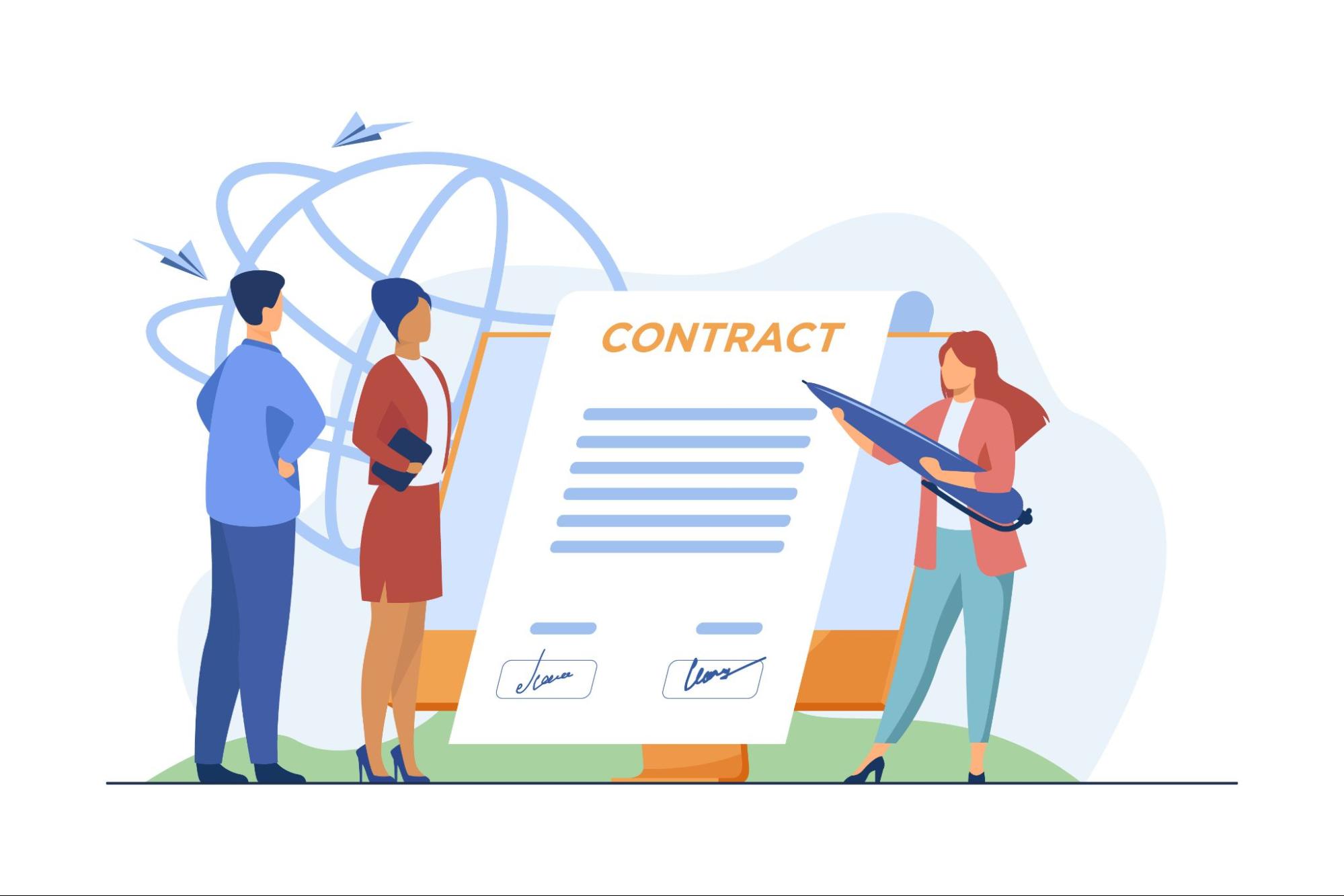Contracts are designed to be binding and enforceable, making them difficult to exit. However, there are circumstances under which a contract can be terminated through "frustration."
In this guide, we'll explore contract frustration, the conditions under which it occurs, some real-world examples, and a bit about frustration contract law.
What is Contract Frustration?

A contract is said to be frustrated when it becomes impossible to fulfil due to an unforeseen event that neither party could have anticipated or is responsible for. This supervening event renders the contract null and void, releasing all parties from their obligations.
When the frustration of contract occurs, the agreement terminates immediately, and all parties are discharged from any future obligations. This means that neither party is required to fulfil their contractual duties, nor can they sue the other for breach of contract.
Conditions for Frustration Of Contract
Proving contract frustration is challenging because contracts are meant to protect the interests of all parties involved. Therefore, the legal threshold for frustration is high. The concept exists to ensure that when an unforeseeable event occurs, both parties receive a fair outcome.
Examples of Contract Frustration
- Natural Disasters: A contract that involves a performance that is rendered impossible by a natural disaster (such as a flood or earthquake) can be considered frustrating.
- Legal Changes: If new laws or regulations make the performance of a contract illegal, the contract can be frustrated.
- Death or Incapacity: In contracts involving personal services, the death or incapacity of the individual providing the service can lead to frustration.
What Is Frustration in Contract Law?
Frustration contract law is a doctrine that applies when an unforeseen event fundamentally changes the nature of a contractual obligation, making it impossible or radically different to perform. This legal principle ensures that parties are not bound to fulfil their duties when extraordinary circumstances arise that were not anticipated by either party at the time of contract formation.
Natural disasters, legal changes, and the death or incapacity of a key individual are examples of such events. When a contract is deemed frustrated, it is automatically discharged, releasing all parties from their future obligations and nullifying the agreement.
However, proving frustration is stringent, requiring that the event in question be truly unforeseeable and outside the control of the parties involved. This doctrine balances the need for contractual certainty with fairness, ensuring that neither party is unjustly penalised for circumstances beyond their control.
When is a Contract Frustrated?
A contract is frustrated when a supervening event makes it impossible to fulfil the contractual obligations or alters the nature of the performance so drastically that it becomes radically different from what was initially agreed upon.
The legal standard for frustration was established in the 1956 case, Davis Contractors Ltd v. Fareham Urban District Council. The ruling states:
"... frustration occurs whenever the law recognizes that without default of either party, a contractual obligation has become incapable of being performed because the circumstances in which performance is called for would render it a thing radically different from that which was undertaken by the contract."
The key term here is "radically different." To demonstrate frustration, you must show that a supervening event has occurred that significantly changes the nature of your contractual obligations.
In essence, fulfilling your contractual duties would now require you to undertake something entirely ("radically") different from what was originally agreed upon.
Still unclear? Let’s consider an example.
Frustration of Contract Example in Software Development
Imagine you're a software development company contracted to create a custom software application for a client. You’re in the final stages of development and are set to deliver the completed software next week. However, the day before delivery, a sudden and unprecedented cyberattack destroys all your servers, erasing the software and its backups.
If such cyberattacks are extremely rare and unpredictable in your region, your contract with the client would likely be considered frustrated. This unforeseen event (the cyberattack) makes it impossible to deliver the software as agreed, thus discharging you from your contractual obligations.
However, suppose your company operates in a region known for frequent cyberattacks, and you fail to implement standard cybersecurity measures. In that case, the client might have grounds to sue you for breach of contract. In this case, the risk of a cyberattack was foreseeable, and therefore, frustration of the contract would not apply.
Types of Events That Can Cause Frustration Of Contract

For a contract to be frustrated, an event must significantly impact the agreement, rendering it impossible to fulfil. Here are some examples of events that can lead to contract frustration and how they might play out in practice.
1. Death or Incapacity of a Party
If one of the parties involved in a contract dies or becomes incapacitated, the contract can be frustrated because the party is no longer able to fulfil its contractual obligations. It's important to note that this applies only to individuals, not companies or other legal entities.
2. War or Riot
A contract can also be frustrated by a war or riot. These events are typically beyond the parties' control and can make it impossible to perform the contract, especially when it involves international transactions.
3. Act of God
Acts of God are natural events that occur without human intervention and cannot be predicted or prevented. Examples include earthquakes, exceptionally heavy storms, floods, and similar natural disasters. Such events can make it impossible to fulfil a contract, leading to frustration.
4. Change in Law
A contract can become frustrated if there is a change in the law that prohibits or prevents the fulfilment of the contract. For instance, if a product or service becomes banned or if a trade embargo is imposed on a country, the affected contracts would be frustrated as performance becomes illegal.
Real-Life Examples of Contract Frustration
Understanding the concept of contract frustration is easier with real-life examples. Here are two landmark cases that illustrate how frustration can occur and its legal implications.
Fibrosa Spolka v Fairbairn (1943)
In 1939, Fairbairn, a British company that manufactured textile machinery, agreed to supply machines to Fibrosa Spolka, a Polish company. Fibrosa Spolka made an initial payment as stipulated in the contract. However, before the machines could be delivered, Germany invaded Poland, and Great Britain subsequently declared war on Germany. This led to the enactment of a new law making it illegal for British companies to trade with Poland, which was now considered enemy territory. As a result, the contract was held to be frustrated due to the change in law.
Taylor v Caldwell (1863)
In another notable case, Taylor hired Caldwell's music hall to hold four concerts. Unfortunately, a week before the first concert, the music hall burned down. Taylor attempted to sue Caldwell for breach of contract and claim damages. However, the court ruled that the contract was frustrated because the subject matter of the contract (the music hall) had been destroyed, making it impossible to fulfil the contractual obligations.
Destruction of Subject Matter
Contracts can also be frustrated if the subject matter is destroyed. For instance, if a flood or fire destroys the essential goods or property involved in the contract, it can lead to frustration. This scenario was clearly demonstrated in the Taylor v Caldwell case, where the destruction of the music hall made it impossible to proceed with the concerts.
Now that we've seen examples of when a contract can become frustrated let’s explore the consequences of frustration. When a contract is declared frustrated:
What Happens After A Contract Is Frustrated?
When a contract is frustrated, it is discharged, releasing all parties from their obligations. No party can sue the other for breach of contract. This discharge takes effect from the day the supervening event occurs. Obligations that were due before the event, however, remain enforceable.
For instance, if a party owed money for goods delivered before the frustrating event, they would still need to pay for those goods. Conversely, if an advance payment was made for goods not yet received due to the frustrating event, that payment would be refundable. Additionally, certain secondary obligations, such as confidentiality clauses, might still apply depending on the contract terms.
The specific financial repercussions and remaining obligations will vary based on the contract's details and the applicable law in your jurisdiction. For example, in the UK, these matters are governed by the Law Reform (Frustrated Contracts) Act 1943.
When Will a Contract Not Be Frustrated?

Proving frustration of a contract is challenging, and for good reason. A contract cannot be declared frustrated simply because fulfilling the obligations has become more difficult or expensive than initially anticipated.
Example Case: Tsakiroglou & Co Ltd v. Noblee Thorl
A notable example is the case of Tsakiroglou & Co Ltd v. Noblee Thorl. The defendant had agreed to ship peanuts to Hamburg and planned to transport them via the Suez Canal. However, the canal was closed due to military operations by British and French forces against Egypt. Although the goods could have been shipped via the Cape of Good Hope, this route would have taken several additional days and increased costs significantly. The defendant refused to ship the goods, claiming the contract was frustrated. The court, however, disagreed, ruling that the increased cost and time did not make fulfilling the contract radically different.
Conditions Where Frustration Does Not Apply
- Self-Induced Inability: If you are unable to fulfil your contractual obligations due to your fault or actions, you cannot claim frustration.
- Force Majeure Clause: If your contract includes a force majeure clause, which removes liability for unforeseen and unavoidable catastrophes, you cannot claim frustration. The force majeure clause typically outlines specific events and conditions under which parties are excused from their obligations.
- Predictable Events: If the event causing the difficulty was foreseeable or could have been predicted, frustration does not apply. The event must be genuinely outside of the parties' control and beyond reasonable foresight.
While the frustration of a contract is difficult to prove, there are other methods to manage contractual risk and ensure compliance. By carefully drafting contracts, including appropriate clauses, and planning for potential disruptions, parties can better navigate challenges and maintain contractual integrity.
Key Takeaway
Contract frustration is a legal concept that allows parties to be released from their contractual obligations when unforeseen events render performance impossible or radically different from what was initially agreed upon. While this principle provides a safety net for parties caught in truly unforeseeable circumstances, proving frustration is not straightforward. The high threshold ensures that contracts remain binding and enforceable, protecting the interests of all parties involved.
One effective solution for reducing contract administration and mitigating risk is to use contract automation software like Pact. Pact helps streamline the contract management process, ensuring compliance and reducing the likelihood of errors or disputes.




